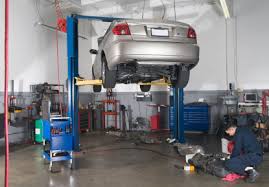
Avoid Costly Auto Repairs by considering these recommendations from Consumer Affairs:
Neglecting preventative maintenance and minor repairs
Ignoring simple preventative maintenance, like changing the engine oil and filter, could damage your engine. It can also mean the difference in extending the life of your car. Failing to make minor car repairs, such as replacing a thermostat or front brake pads, could result in more expensive repairs in the future. Other simple, but important, tasks that car owners should consider include changing the transmission fluid, checking the coolant (level, mixture, and condition), and checking tire pressure on a regular basis.
Not asking for your parts back
If a part needs to be replaced on your car, always ask for your old part back; simply ask the mechanic to place the old part in the new part's box. Unfortunately, some dishonest repair shops may charge you for work that was not done or repairs that are not necessary. Asking for your old parts back confirms that the new part was actually installed, and it keeps the mechanic from replacing a part that is still good.
Neglecting your tires
Driving on under-inflated tires can shorten the life of your tires, increase tire wear and lead to significant tire damage from heat, potholes and other road hazards. If the tire fails completely, you could lose control of the vehicle. Plus, keeping your tires inflated to the proper pressure can improve your gas mileage by up to 3.3 percent. Don't be tempted to get more mileage out of your tires by driving on them when they are bald. Driving on bald tires can reduce vehicle traction and lead to an accident.
Ignoring dashboard warning lights
Dashboard warning lights are just that, warning lights! Pay attention to them – they could be warning you about a serious maintenance problem that could lead to expensive repairs or unsafe driving. Be sure to read your owner's manual and familiarize yourself with what the different warning lights on your car's dashboard mean – Check Engine Light, Oil Light, Temperature Light, Brake Light – and what action you should take for each. Never ignore your Check Engine Light, thinking the car is running fine. Your MPG could be reduced by as much as 30 percent. A blinking Check Engine light indicates a severe misfire that could damage your car's expensive catalytic converter. And ignoring the oil and temperature lights can result in an expensive engine replacement.
Telling your mechanic what parts to replace
Today's vehicles are extremely complex, and while it is a good idea to do your research, some vehicle symptoms can be misleading. For example, you may be convinced that your car needs new spark plugs or an engine tune-up, when you really need the MAF sensor cleaned. If you tell your mechanic to replace the spark plugs instead of asking him to diagnose the problem, he will do it and charge you for it, leaving you with the same unresolved issue.
Failing to properly communicate your repair issue
If you can't describe the problem effectively, your mechanic will spend more time diagnosing, meaning more labor costs, and may come to the wrong conclusion. Write down what you hear, feel, see, and smell before you arrive and keep a log of exactly when the symptoms occur and share this with your mechanic.
Driving on fumes
Most cars on the road today have electric fuel pumps mounted inside the fuel tank. Back in the 70s and 80s, when cars had carburetors, you could drive until all the gas was gone, refuel, and drive again with no problem. However, most of today's vehicles have fuel-injected engines that rely on in-tank electric pumps that use gas to cool and lubricate its components. Driving your fuel injected engine frequently on fumes could cause the pump to fail, leading to a repair costing hundreds of dollars.
Visiting the dealership for every repair/maintenance issue
Car owners can save an estimated $300+ a year on average by opting for their local independent repair shop versus the car dealership. In some cases, the dealership service center can make more sense than the local repair shop for recalls, warranty work or very complex repair issues. However, for many jobs, if you do your research and find the right independent repair shop, a repair can be done by an expert mechanic at a savings of potentially hundreds of dollars.